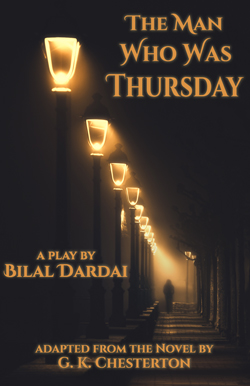
According to the origin story at its website, SordeletINK traces its roots to a production of King Lear at Chicago's Goodman Theatre, where a backstage rapport arose between international stunt-coordinator Rick Sordelet and Michigan Shakespeare Festival resident fight director David Blixt, the latter of whom was then proofing final galleys for his first novel, The Master of Verona. The hardcover edition's middling reception following its initial release propelled its author to pursue digital re-issue of the book on Kindle and Nook. Conversations were initiated, a kickstarter campaign launched and in 2012, the purveyors of yarns replete with adventure, athletics and imaginative fancy debuted on the small-press scene with five brand-new novels.
The procedure hasn't altered significantly, reports Blixt. "Sitting around in a bar after a show, somebody will say 'Hey, have you heard about so-and-so? They got this great script and can't get it published' and one of us will tell them to send it to us and we'll check it out."
 Sometimes the process works in reverse. "We see a show that knocks our socks off, and we reach out to the playwright and ask if they've signed with a publisher yet. This is how we got Ron Keaton's Churchill—another publisher was nibbling at a contract while it was off-Broadway, but we circled back a year later and now Churchill is part of our catalogue."
Sometimes the process works in reverse. "We see a show that knocks our socks off, and we reach out to the playwright and ask if they've signed with a publisher yet. This is how we got Ron Keaton's Churchill—another publisher was nibbling at a contract while it was off-Broadway, but we circled back a year later and now Churchill is part of our catalogue."SordeletINK differs from so-called "self-publishing" enterprises in that its authors are never asked to contribute their own money. From the moment a script is accepted, all the way up to the delivery of the finished volumes, the production costs are on the house. "If the writer has a favorite image—a show poster, for example—for the cover, they might assist in securing it from the theater," Blixt concedes, "but otherwise, the services we provide are limited to paper and print."
Lifeline Theatre author-adapter Robert Kauzlaric is quick to acknowledge the promotional advantages offered a company with a huge library of pubic domain page-to-stage adaptations—the convenience to potential producers of ordering scripts for perusal, for example, or to theaters looking to increase revenue from lobby merchandise.
Award-winning playwright Joseph Zettelmaier likewise concurs. "[David and Rick] don't market shows or negotiate copyrights and leasing—they're publishers, not agents—but I enjoy contracting with theaters on my own, and one of the things I love about SordeletINK is that it allows me this level of control."
"What it also does," he adds, " is to keep me apprised of my sales, so that if a particular play is being bought up in unusually large quantities, I can anticipate a query soon thereafter from a theater asking about production rights."
SordeletINK's inventory isn't restricted to a single genre, however. Scheduled for future release are the memoirs of David Boushey, a founding member of the Society of American Fight Directors, as well as Blixt's latest series of novels, based on the real-life career of pioneering feminist journalist Nellie Bly (neé Elizabeth Cochrane). Sordelet himself also hints at inroads into film scripts and television pilots coming soon. In the meantime, he admonishes those struggling to find support for their voices, "Write your stories and let's share them"
For information and catalogue, access www.sordeletink.com
Mary Shen Barnidge
Contributing Writer
